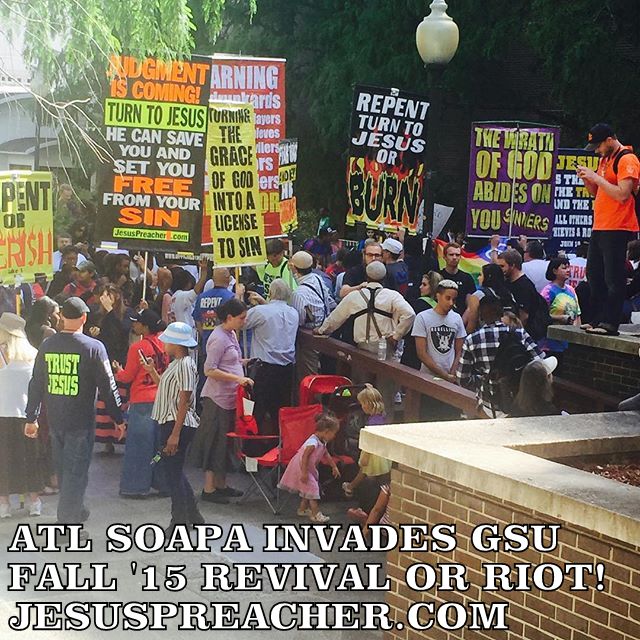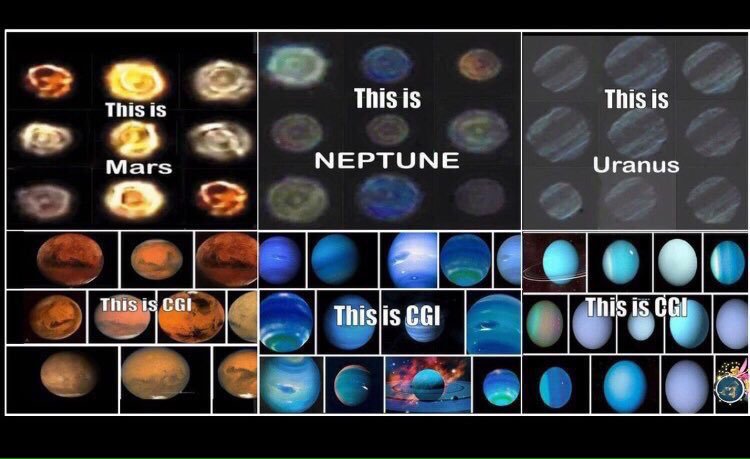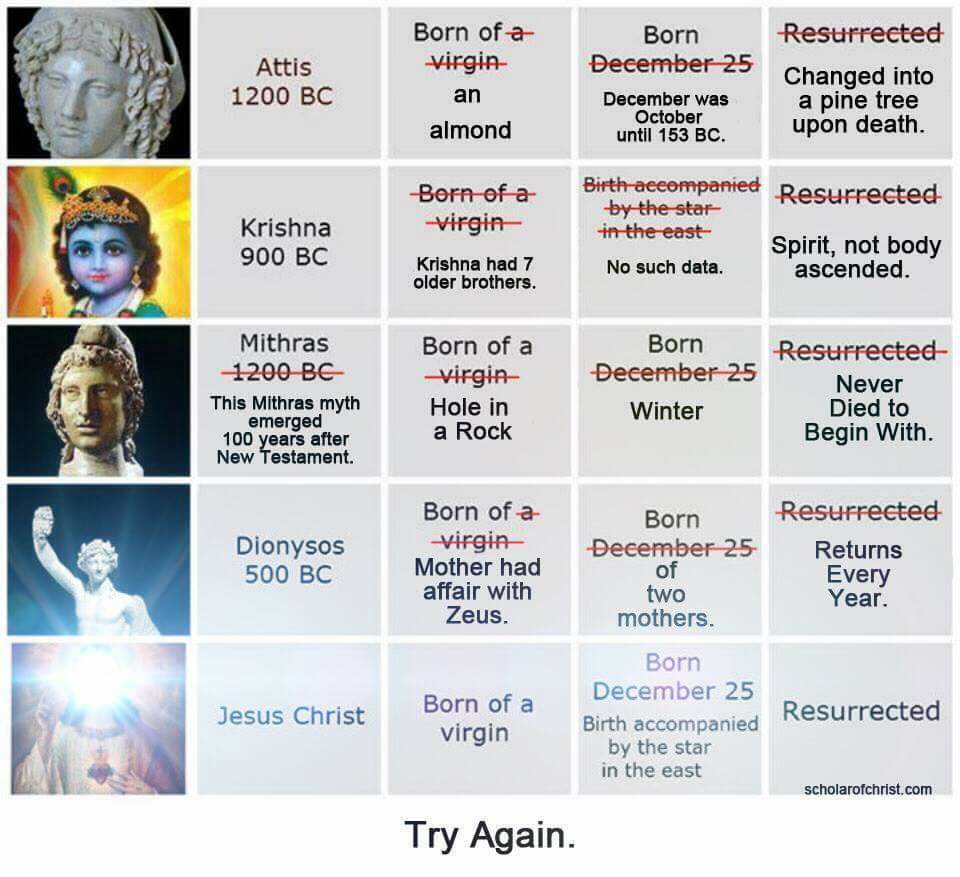
by John McGlone
The following letter is from a discourse I had some seven years ago with my friend Ben Narsil who helps to coordinate the SOAPA conferences. I was going through some old study notes and found his very well articulated letter. I was in a season where I was confusing some key passages about the gentleness of the elder or pastor toward brethren, and the ministry of the open air preacher to the lost heathen. In short, his well laid out arguments point to many differences in the offices of the preacher and the pastor. I find that most Christian denominations will call the Pastor a preacher, when he never does that function either in or outside the building they call ‘church’. He will teach, but very rarely do they preach the Gospel in the truest sense of the word. Please, read carefully. I find that this communication is very nicely done.
Thank you.
Regards in Christ,
John McGlone, Jesus Preacher Ministries
Dear Bro. McGlone,
I am sorry that you feel the way you do about our disagreement on the application of the GENTLENESS paradigm to the delivery of the message of the Will of God to sinners. You will be missed. The SOAPA conference is like Christmas to me…it is a time when this local area is blessed with the delivery of a solid message on the Will of God and what sinners must do in response to this revelation. Frankly, I am sorry that you are allowing our disagreement to stand between you and the fellowship of the brethren at the conference as well as the conversations you might have had with local sinners on their way to Hell. We have already lost several other brethren this year due to the fact that they cannot abide with those who hold contrary views to their Calvinist beliefs. I have even lost fellowship with my brother-in-law, Bro. XXXX XXXXXX, over these very same kind of issues and it is always a religious subject matter at the heart of the disfellowship. I was told by Pastor XXXXX XXXX (Independent Baptist) after asking him to speak at another SOAPA conference that he could not do so because he found out that I was divorced and in his opinion I should not even be open air preaching…XXXXX XXXXXX will not attend a SOAPA conference ever again because we had a disagreement over the way that I handled a situation involving an individual that attended a SOAPA conference in 2007. This individual was from the Church of Christ and in XXXXX’s opinion he was a heretic and XXXXX wanted me to denounce the guy from the pulpit in the church. I refused to do so and in a moment of “gentleness” I spoke to the individual privately and took care of the matter in this fashion. You really don’t know much about my personal background, formal Christian education or struggle with the pastors over the years. If you did then perhaps you would consider my position on the subject that you choose to speak on with a little more introspection. I don’t know how many churches you have been a member of, how long you endured at these churches, how long you have been doing this kind of ministry, how many other types of ministries you have been involved in, what other types of work you have done in the harvest field or what your formal Christian educational background is. All of these things help one to understand and contextualize the stance from which a particular man of God is delivering a message. As you know, the THEME of the conference is the LOVE of God. You decided that you wanted to deliver a piece on GENTLENESS. It was your decision to go against the flow of the overall theme and take that stance. It is a subject that has a lot to do with PASTORAL DUTIES and there is a huge gulf between the duties of a Pastor and the work of the open air preacher in Post Christian America. Obviously this is not a pastor’s conference even though, remarkably, we have some pastors that are speaking at it…again, you will be missed.

I have given your position on the application of the Gentleness paradigm to the open air preaching venue some further consideration and analysis. This is the product of that work…
I began my analysis of the Biblical meaning of “Gentle” as it was used by Paul in his Epistles to both Timothy and Titus by taking another look at 2 Tim 2:19-26
19 Nevertheless the foundation of God standeth sure, having this seal, The Lord knoweth them that are his. And, Let everyone that nameth the name of Christ depart from iniquity.
20 But in a great house there are not only vessels of gold and of silver, but also of wood and of earth; and some to honour, and some to dishonour.
21 If a man therefore purge himself from these, he shall be a vessel unto honour, sanctified, and meet for the master’s use, and prepared unto every good work.
22 Flee also youthful lusts: but follow righteousness, faith, charity, peace, with them that call on the Lord out of a pure heart.
23 But foolish and unlearned questions avoid, knowing that they do gender strifes.
24 And the servant of the Lord must not strive; but be gentle unto all men, apt to teach, patient,
25 In meekness instructing those that oppose themselves; if God peradventure will give them repentance to the acknowledging of the truth;
26 And that they may recover themselves out of the snare of the devil, who are taken captive by him at his will.
I asked myself the following questions:
- Is Paul addressing the subject of the public proclamation of the Gospel in this passage?
- Is Paul setting forth “Public Preaching Tips” for Timothy and for everyone else throughout history in every setting and every situation?
- In verse 24, was Paul citing another portion of Scripture found in the Old or New Testament where the same subject matter is addressed?
- Is the “Pastoral” ministry the focus of this passage or is the “Prophetic or Preaching” ministry the focus of this passage?
- Are there any other parallel passages of Scripture that one can point to that might support one’s conclusion about the meaning and application this passage?
- Are there passages of Scripture that one can cite that contradict ones conclusion about the meaning and application of this passage?
Answers:
- Paul is NOT addressing the public proclamation of the Gospel, open air preaching, street preaching, campus preaching or pulpit preaching in this passage…he is addressing the problems associated with the PASTORAL ministry and especially those that were causing some of the Christians to abandon a life of holiness and pure devotion to Christ.
- Paul was not setting forth absolute guidelines for the public declaration of the Word of God that were to be enshrined in perpetuity as the chief cornerstone, rule of thumb and plumb line that characterizes those that preach the Word.
- The answer is a qualified NO. A quick check of cross references for 2 Tim 2:24 reveals that this instruction was not originally set forth in any other non-Pauline text, in fact, the only cross references are to other Pauline Epistles. This passage is cross referenced with 1 Tim 3:2 A bishop then must be blameless, the husband of one wife, vigilant, sober, of good behaviour, given to hospitality, apt to teach;… Titus 1:9 Holding fast the faithful word as he hath been taught, that he may be able by sound doctrine both to exhort and to convince the gainsayers…Titus 3:2 To speak evil of no man, to be no brawlers, but gentle, shewing all meekness unto all men.
- This passage is dealing with the duties of a Shepherd of the flock or a BISHOP in the Church.
- YES, there are parallel passages or similar passages, 1 Tim 3:2, Titus 1:9 and Titus 3:2
- YES, this needs to be examined and explored in greater detail.
Paul appears to be giving the same instruction to Titus in chapter 3 verse 2 as he gave to Timothy in 2 Tim 2:24. What was the situation with Titus 3:2?
Paul starts his letter to Titus with the following statement:
1 Paul, a servant of God, and an apostle of Jesus Christ, according to the faith of God’s elect, and the acknowledging of the truth which is after godliness; 2 In hope of eternal life, which God, that cannot lie, promised before the world began; 3 But hath in due times manifested his word through preaching,
So, is Titus 3:2 to be understood as being directly connected with “preaching”?
The answer is NO.
Why is it NO?
Titus 3:1 holds the answer: “Put them in mind to be subject to principalities and powers, to obey magistrates, to be ready to every good work,”
Who is the “THEM” in verse 1? It is the congregation…the believers…this is not a text concerning the preaching of the Word in a public setting to a crowd of apostates, reprobates, homo sex perverts and lesbians…
Now we look at Titus 3:2 “To speak evil of no man, to be no brawlers, but gentle, shewing all meekness unto all men.”
This describes the desired characteristics of church members as they live out their daily lives at work, at home and in the church. This does not and was not intended as a description concerning the attitude and disposition of the PROPHET or PUBLIC REPROVER when he is declaring, with all authority, the Will of God to people that have come to believe that homosexuality and lesbianism are “OK” with God and that homos can be considered “saved” and on their way to heaven.
The commentary found in Family Bible Notes confirms this:
Speak evil of no man; falsely or unnecessarily. True religion makes good subjects, quiet citizens, peaceful neighbors, and renders men meek, patient, and forgiving in all the relations of life.
Matthew Henry comments in a similar way concerning the Epistle to Titus:
Of duties which concern Christians more in common, and the reasons of them, Tit 3:1-8.
This confirms my point…Paul is describing the desired characteristics or duties of common believers in their daily lives…to be peaceful neighbors and quite citizens…THIS IS NOT talking about those who are called out of the sheepfold to “lift up their voice and cry aloud, spare not, shew My people their sins”
Isa 58:1 Cry aloud, spare not, lift up thy voice like a trumpet, and shew my people their transgression, and the house of Jacob their sins.
Jamieson-Fausett-Brown commentary qualifies the meaning of “GENTLE” in this passage
gentle–towards those who attack us.
John Wesley qualifies the meaning of the word “GENTLE” as:
To be gentle-When assaulted.
Matthew Henry comments:
To be gentle; equitable and just, or candid and fair in constructions of things, not taking words or actions in the worst sense; and for peace sometimes yielding somewhat of strict right.
The New Commentary on the Whole Bible comments:
gentle—toward those who quarrel with us.
Gentleness when attacked, not taking words or actions in the worst sense, gentle towards those who quarrel with us and gentle when assaulted…WHY would a nice, quiet, peaceful Christian in the First Century Church need to worry about being attacked and assaulted in the first place? Because they were a threat to both Jewish and Pagan national security in the sense that they stood opposed to the rampant moral depravity of the Greek lifestyle (rampant homosexuality) as well as that which was promoted by both the Pharisee and Gnostic Jewish sects.
Again, this verse is not to be taken as instructional material for the open air preaching ministry. It is specifically targeted at the common characteristics to be exemplified in the daily lives of church members. Should the open air preacher or campus preacher be GENTLE when attacked or assaulted? Yes, he should! This is the meaning of the word…it does not mean that the open air preacher should lower his voice, tone down his message, soften his delivery and approach to the subject of sin and sinners and then make every effort to avoid confrontation or offense by avoiding certain or specific words that the culture of our day and age deems as “hate speech”…
What was the OBJECTIVE set forth by Paul in his opening statement to Titus in Chapter 1?
5 For this cause left I thee in Crete, that thou shouldest set in order the things that are wanting, and ordain elders in every city, as I had appointed thee:
Clearly this letter was intended to be understood, as his letters to Timothy were, as a guide for the PASTORAL MINISTRY to which they were appointed. Paul cuts to the chase in describing the TYPE of men that Titus should ORDAIN as elders in the rest of Chapter 1 which follows:
6 If any be blameless, the husband of one wife, having faithful children not accused of riot or unruly.
7 For a bishop must be blameless, as the steward of God; not selfwilled, not soon angry, not given to wine, no striker, not given to filthy lucre;
8 But a lover of hospitality, a lover of good men, sober, just, holy, temperate;
9 Holding fast the faithful word as he hath been taught, that he may be able by sound doctrine both to exhort and to convince the gainsayers.
10 For there are many unruly and vain talkers and deceivers, specially they of the circumcision:
11 Whose mouths must be stopped, who subvert whole houses, teaching things which they ought not, for filthy lucre’s sake.
12 One of themselves, even a prophet of their own, said, The Cretians are alway liars, evil beasts, slow bellies.
13 This witness is true. Wherefore rebuke them sharply, that they may be sound in the faith;
14 Not giving heed to Jewish fables, and commandments of men, that turn from the truth.
15 Unto the pure all things are pure: but unto them that are defiled and unbelieving is nothing pure; but even their mind and conscience is defiled.
16 They profess that they know God; but in works they deny him, being abominable, and disobedient, and unto every good work reprobate.
So, after Paul gives a list of characteristics that qualify one for the office of Bishop he then zeros in on vs.9 and gives the MAIN reason why these men should be chosen for this office. It’s not enough to be a “nice guy” in the local church, it’s not enough to be a lover of good men, to be sober, just, holy and temperate…you could be all these things and still not qualify for the office of a Bishop. A Bishop needs to be one that is firmly rooted in sound doctrine AND one that is not afraid to HOLD FAST the “faithful word” because one of the key aspects of the responsibility of the Bishop is to STOP THE MOUTHS of those who subvert the Truth…A Bishop must have the spine to REBUKE those who subvert the Truth.
Paul does not say: REBUKE THEM GENTLY or give them a gentle rebuke…REBUKE THEM SHARPLY!
Who is it that Paul wants Titus and or the Bishops to rebuke sharply? Verse 16…those that are mere professors of Christianity but in their works and in particular their HOMO SEX ABOMINATIONS deny Him!!! These FALSE professors of faith in Christ are the ones that need the SHARP REBUKE! And a sharp rebuke is not to be understood as a being given in a gentle manner.
Paul continues his exhortation to Titus in Chapter 2 with the following
11 For the grace of God that bringeth salvation hath appeared to all men,
12 Teaching us that, denying ungodliness and worldly lusts, we should live soberly, righteously, and godly, in this present world;
13 Looking for that blessed hope, and the glorious appearing of the great God and our Saviour Jesus Christ;
14 Who gave himself for us, that he might redeem us from all iniquity, and purify unto himself a peculiar people, zealous of good works.
15 These things speak, and exhort, and rebuke with all authority. Let no man despise thee.
Please note that Paul does not say REBUKE WITH ALL GENTLENESS…
At this point it is incumbent upon us to consider the gravity of these admonitions in light of your opinion that the instruction given to Titus concerning gentleness should be universally applied to the attitude and disposition of those who are called to the open air preaching ministry…it is my opinion that these admonitions contradict your proposition. I would also point out what various commentaries have had to say concerning this passage in Titus:
Adam Clarke Titus 2:15
FEW portions of the New Testament excel this chapter. It may well form the creed, system of ethics, and text book of every Christian preacher. Does any man inquire what is the duty of a Gospel minister! Send him to the second chapter of the Epistle to Titus for a complete answer. There he will find what he is to believe, what he is to practise, and what he is to preach. Even his congregation is parcelled out to him. The old and the young of both sexes, and those who are in their employment, are considered to be the objects of his ministry; and a plan of teaching, in reference to those different descriptions of society, is laid down before him. He finds here the doctrine which he is to preach to them, the duties which he is required to inculcate, the motives by which his exhortations are to be strengthened, and the end which both he and his people should have invariably in view.
These are truths which must be preached, which are not preached enough, and which cannot be preached too often. Awake, pastors! and do not the work of the Lord carelessly. Awake, people! and believe to the saving of your souls. How shall he who is styled a minister of the Gospel, and who neither knows, feels, nor heartily inculcates these things, give an account in the great day, of himself, his calling, and his flock, to God? And when this Gospel is preached faithfully and zealously, how shall the people escape who neglect so great a salvation? Neglect, in such a case, is the highest contempt which man can offer to his Maker. Surely such conduct must expect judgment without mixture of mercy. Reader, lay this to heart. (In my opinion, this commentary reaffirms the point that this message is directed to PASTORS and their pastoral duties as a shepherd of the flock. It is not a commentary on transferring the Pastoral paradigm or template onto the function or job description of the open air preacher who is dealing with a raw, mixed multitude raised in a post-Christian American culture.)
Albert Barnes Comments (and I whole heartily agree with him on this…)
Verse 15. And rebuke with all authority. See Barnes for 1Ti 5:1, See Barnes for 1Ti 5:20; See Barnes for 2Ti 4:2. The word authority here means command epitagh. 1Co 7:6; 16:24; 2Co 8:8; 1Ti 1:1; Tit 1:3. The sense here is, he was to do it decidedly, without ambiguity, without compromise, and without keeping any thing back. He was to state these things not as being advice or counsel, but as the requirement of God. (Note, Barnes does not say REBUKE WITH ALL GENTLENESS OF SPIRIT…and he adds that this delivery is NOT a form of ADVICE or COUNSEL…it is not done in a fashion where there is the option of negotiation or apology)
Barnes Comments on 1 Tim 5:20 Verse 20.
Them that sin. That have been proved to have committed sin–referring probably to the elders mentioned in the previous verse, but giving the direction so general a form that it might be applicable to others. Rebuke before all. Before all the church or congregation. The word rebuke properly denotes to reprove or reprehend. It means here that there should be a public statement of the nature of the offence, and such a censure as the case demanded. It extends only to spiritual censures. (In my opinion the PUBLIC STATEMENT of the nature of the offense means that the offense will be described in detail and properly addressed from the viewpoint of the God of the Bible.)
That others also may fear. That they be kept from committing the same offence. Comp. 1Pe 2:14. The end of punishment is not the gratification of the private feelings of him who administers it, but the prevention of crime. (I agree with the point in this commentary…that articulating the end punishment for crimes against nature and natures God should cause FEAR in the hearts and minds of the sinner and that this AUTHORITATIVE and NO HOLDS BARRED approach does not include the notion of gentleness.)
Barnes Comments on 2 Tim 4:2
Rebuke. Rebuke offenders. In the New Testament the word is used to express a judgment of what is wrong, or contrary to one’s will, and hence to admonish or reprove. It implies our conviction that there is something evil, or some fault in him who is rebuked. The word in this verse rendered reprove, does not imply this, but merely that one may be in error, and needs to have arguments presented to convince him of the truth. The propriety of the rebuke rests on our authority for doing it, not on the arguments which we present. This is based on the presumption that men often know that they are doing wrong, and need no arguments to convince them of it. The idea is, that the minister is not merely to reason about sin, and convince men that it is wrong; but he may solemnly admonish them not to do it, and warn them of the consequences. (I whole heartily agree!!!! That the minister is NOT MERELY to reason about sin and convince men that it is wrong BUT that there is this NON-GENTLE approach to solemnly admonish…not to gently admonish, not to softly admonish, not to admonish them with reason by appealing to the intellect and rational thought processes but to drop the hammer on the heart with all seriousness and strength.)
Mathew Henry comments on Titus 2:15
The great and necessary truths and duties of the gospel, especially, these speak and exhort, parakalei, press with much earnestness. Ministers must not be cold and lifeless in delivering heavenly doctrine and precepts, as if they were indifferent things or of little concern; but they must urge them with earnestness suitable to their nature and importance; they must call upon persons to mind and heed, and not be hearers only, deceiving themselves; but doers of the word, that they may be blessed therein. And rebuke; convince and reprove such as contradict or gainsay, or neglect and do not receive the truth as they should, or retain it in unrighteousness–those who hear it not with such a believing and obedient mind and heart as they ought, but, instead of this (it may be) live in contrary practices, showing themselves stubborn and disobedient, and to every good work reprobate. Rebuke with all authority, as coming in the name of God, and armed with his threatenings and discipline, whoever make light of which will do it at their peril. Ministers are reprovers in the gate.
In my opinion Mathew Henry does not say: Rebuke with all gentleness of spirit, armed with gentleness lest you should offend the sinner and drive them away…He says that we should be ARMED with the threatening and discipline that accompany the WRATH of God against all workers of iniquity and finishes his commentary by stating that Ministers are REPROVERS in the gate…
Question:
Does Paul give Timothy instructions in 2 Tim 2:19-26 that have to do with:
- Timothy’s relationship with his employer or neighbor
- Timothy’s relationships with friends and family
- Timothy’s involvement in secular, non-religious activities
- Timothy’s oversight of the church
Answer: D
Additional Supporting documentation
Commentary on 2 Tim 2:19-20
Adam Clark Comments:
In this place the apostle compares the religion of Christ to a great or noble mansion. See 2Ti 2:20. And as this religion is founded on the authority and power of the Almighty, it necessarily must stand sure and be permanent.
Albert Barnes Comments:
The meaning is, that though some had been turned away by the arts of these errorists, yet the foundation of the church which God had laid remained firm. As long as this foundation remained firm, there was no reason to be troubled from the few-instances of apostasy which had occurred
The meaning is, that it is an elementary principle in the true church, that all who become members of it should lead holy lives. It was also true that they would lead holy lives, and amidst all the defections of errorists, and all their attempts to draw away others from the true faith, those might be known to be the true people of God who did avoid evil.
________________________________________________________________________________
2 Tim 2:19 sets the stage for what is to follow in verses 20-26. The context here is that which has to do with Timothy’s attitude, disposition and course in dealing with problems and the people that create these particular problems WITHIN the church. In particular, it was those people that were causing problems by drawing believers away from the Christian faith. These people are referred to as “ERRORISTS” by Albert Barnes…they were in fact, JEWISH GNOSTICS!
Now let’s take a look at 2 Tim 2:23 “But foolish and unlearned questions avoid, knowing that they do gender strifes.”
Albert Barnes Comments:
Verse 23. But foolish and unlearned questions avoid. See Barnes for 1Ti 1:4; See Barnes for 1Ti 1:6; See Barnes for 1Ti 4:7. The word unlearned, here, means trifling; that which does not tend to edification; stupid. The Greeks and the Hebrews were greatly given to controversies of various kinds; and many of the questions discussed pertained to points which could not be settled, or which, if settled, were of no importance. Such has been the character of no small part of the disputes which have agitated the world. Paul correctly says that the only effect of such disputes is to engender harsh contention. Points of real importance can be discussed with no injury to the temper; but men cannot safely dispute about trifles.
Jamieson Fausset Brown Comments:
unlearned–Greek, “undisciplined”; not tending to promote the discipline of faith and morals (Pr 5:23). “Uninstructive”; in contrast with “instructing” (2Ti 2:25), and “wise unto salvation” (2Ti 3:15).
People’s New Testament Commentary:
Foolish and unlearned questions avoid. Such unprofitable questions and speculations as the false teachers raise.
Robertson’s New Testament Word Pictures Commentary:
Ignorant (apaideutous). Old verbal, here only in N.T. (a privative and paideuô). Untrained, uneducated, “speculations of a half-educated mind”
So, here again, we find that there were those (GNOSTICS) who were causing problems for Timothy in the Church. These trouble makers were causing STRIFE by bringing up FOOLISH and STUPID questions…unprofitable speculations…causing controversy…leading some to abandon the faith. The instructions given to Timothy have to do with dealing with specific problems he was encountering from so who were harassing the church as it were…
How was Timothy to deal with these problems?
2 Tim 2:24 And the servant of the Lord must not strive; but be gentle unto all men, apt to teach, patient,
The key words are: STRIVE, GENTLE, PATIENT
Is Paul giving Timothy instructions on HOW TO PREACH to sinners in a public forum or HOW TO PREACH to new believers in the Church? Is this passage meant to be understood as having to do with Timothy’s PREACHING style? Is Paul concerned that Timothy is preaching to hard, that Timothy is using words in his preaching that his hearers would find to be offensive? In other words, is the main point of this passage concerned with the feelings of the unsaved, wicked sinners that Timothy has been preaching to and their response to his message? The obvious answer is NO…Paul is not giving instruction to Timothy about his preaching style, manner, method or message. Paul is not telling Timothy that he needed to be careful so as not to offend wicked sinners with his choice of specific words when he is preaching. Paul is not telling Timothy that he should be one that does not STRIVE with sinners and that his public ministry should be characterized by the crowd as being GENTLE. Paul is not telling Timothy that he needs to be PATIENT in terms of waiting for sinners to respond to his invitation to surrender all to Jesus…
In summary then I believe that the proposition you have set forth is properly understood within the context of the passage in which it appears and that being within the Church and among the brethren. I believe that the instruction given by Paul was not intended to be applied to the work of the public proclamation of the Will of God to a mixed multitude crowd in post-Christian America and I believe that I have support for this position from a variety of commentaries on the subject and scripture verses in question.
I hope that you will reconsider your decision not to attend the SOAPA conference but if not then I hope that we can remain friends and brothers in the faith.
May God richly bless you and your family!
Sincerely Yours in Christ,
Ben Narsil










